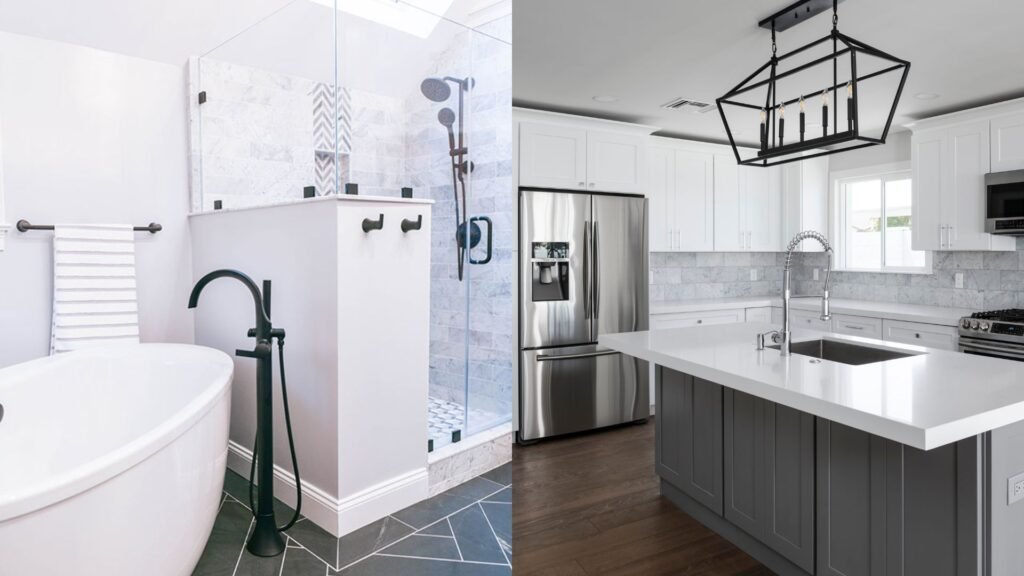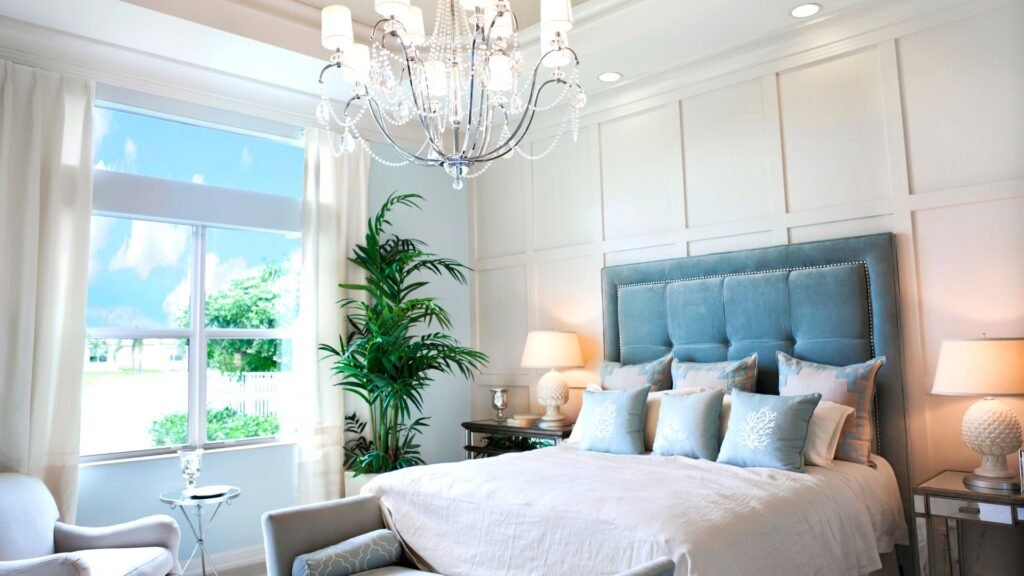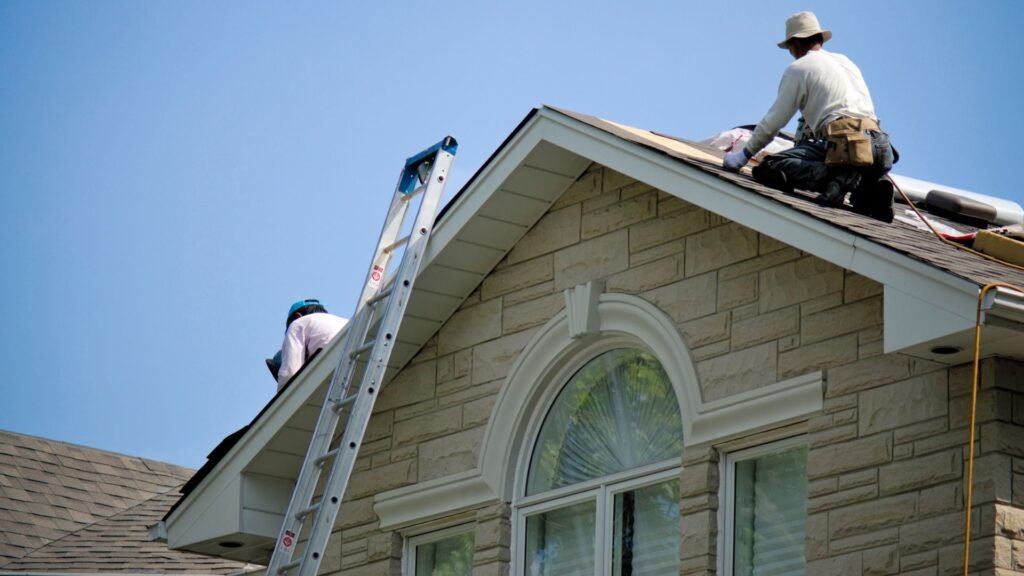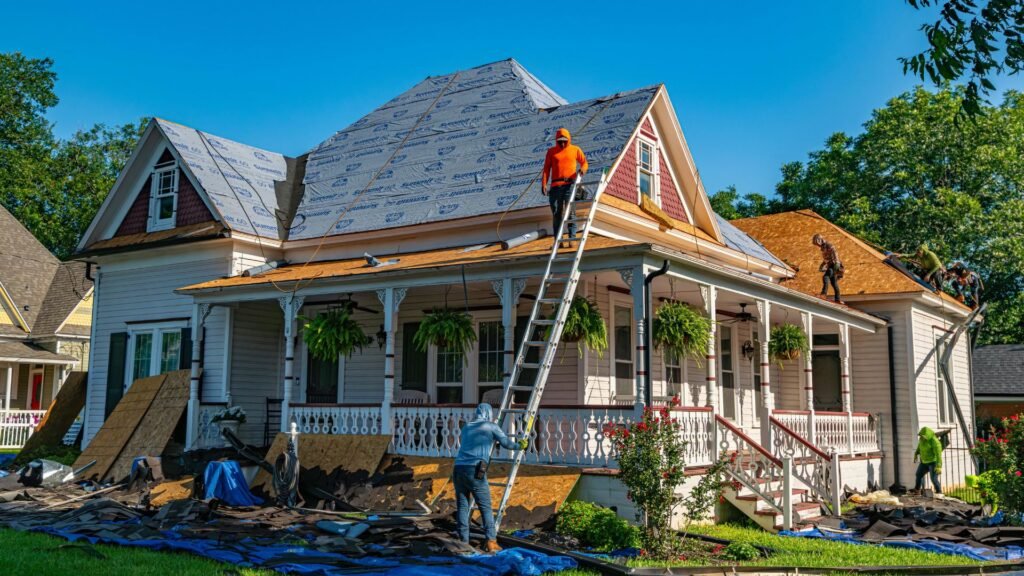Welcome to your guide on kitchen and bathroom renovations in NZ, where we’ll explore why these two spaces are the heart of every Kiwi home and how upgrading them can make a real difference in both lifestyle and property value. Kitchens are where families gather, meals are prepared, and memories are made, while bathrooms are personal spaces that deserve comfort and functionality. Renovating these areas not only modernises your home but can also add significant value if you’re thinking of selling. In this article, you’ll discover everything you need to know, from planning your budget and timeline to exploring the latest design trends and avoiding common mistakes. Whether you’re dreaming of a sleek new kitchen, a relaxing bathroom retreat, or both, this guide will give you the practical tips and local insights you need to start your renovation journey with confidence.
Kitchen and bathroom renovations in NZ improve both lifestyle and property value. A kitchen renovation typically costs between $20,000–$40,000, while bathroom upgrades range from $15,000–$30,000, depending on size and finishes. Popular trends include open-plan kitchens, eco-friendly fixtures, walk-in showers, and smart storage solutions. To get the best results, plan your budget, hire a licensed NZ renovation company, and focus on both functionality and design.
Table of Contents
Why Renovate Kitchens And Bathrooms In NZ?
Kitchens and bathrooms work hard every day. When you update them, you lift comfort, reduce hassles, and make your home easier to sell. Renovation also helps you meet ventilation and moisture standards in wet areas. In rentals, extractor fans are required in bathrooms with baths or showers, which is a common trigger for upgrades. If you plan to rent or sell, getting these spaces right protects value and keeps you on the right side of the rules.
Rising Home Improvement Trends In New Zealand
Renovation is steady across the country. Stats NZ consent data shows thousands of “altered” (alterations and additions) residential consents being issued every quarter. For example, 7,386 alteration consents were issued in 2024 Q2, and levels have remained in the thousands per quarter for the last decade, clear proof Kiwis keep investing in upgrades. Kitchens and bathrooms are frequent targets because they date fastest and deliver daily gains.
Key Motivations: Modernising Outdated Spaces, Improving Functionality, Boosting Resale Value
Modernise Tired Layouts
Open up cramped rooms, refresh worn benchtops and vanities, and swap old fixtures for reliable, water-efficient models. Good lighting and better extraction reduce moisture and mould risk in wet areas.
Improve Function You Feel Everyday
Add storage that fits how you live. Think pull-out pantries, soft-close drawers, mirrored cabinets, and walk-in showers. Smarter layouts cut steps in the kitchen and make morning routines faster.
Lift Buyer Appeal And Confidence
Updated kitchens and bathrooms signal “well cared for.” Local property advice consistently ranks these rooms among the best places to invest when preparing to sell. They’re high-impact during open homes and on listing photos.
Renovations And The NZ Housing Market
Data shared via OneRoof using CoreLogic’s House Value Index suggests wet-area upgrades can make a measurable difference. In the examples reported, adding a second bathroom lifted value more than adding a bedroom, and full modernisation delivered the largest gains, though results varied by region and project scope.
The Emotional Payoff: Comfort, Lifestyle, Family Gatherings, Personal Taste
You feel the benefits every day. A kitchen that flows turns weeknight dinners into easy wins and makes hosting less stressful. A quiet, well-lit bathroom with good ventilation feels cleaner, drier, and healthier. Finishes that match your taste make the whole home feel more “you,” which is powerful for long-term happiness. If you rent your property, meeting the Healthy Homes ventilation rules for kitchens and bathrooms also supports healthier living, good for tenants and for long-term asset care.
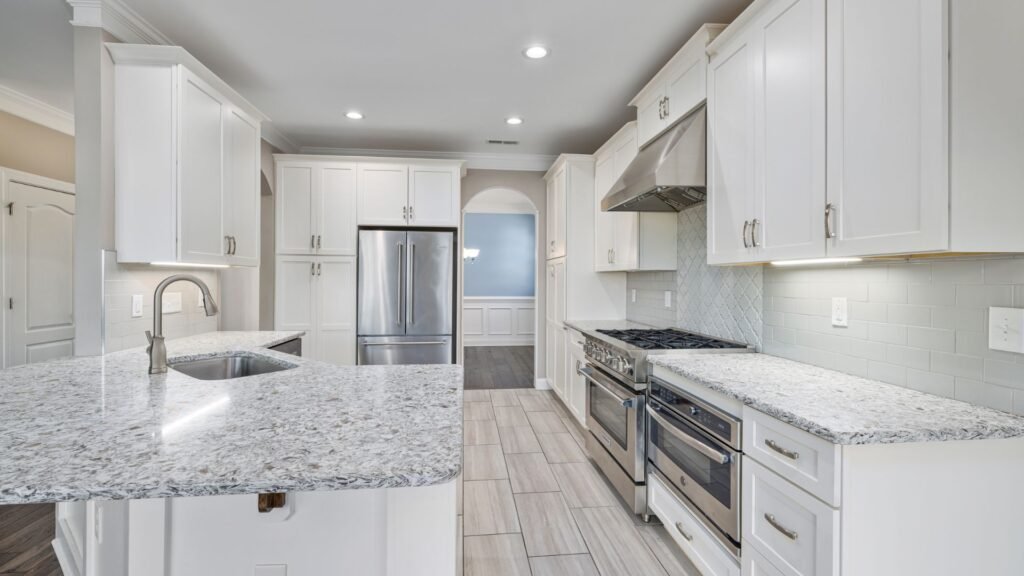
Planning Your Renovation Project
When starting kitchen and bathroom renovations in NZ, proper planning is what separates a smooth project from a stressful one. Taking the time to prepare helps you avoid costly mistakes, stay on budget, and get results that truly fit your needs.
Importance Of Setting Clear Goals
Before you begin, decide what you want to achieve. Are you renovating for aesthetics, functionality, or to boost resale value?
- If your goal is aesthetics, focus on modern finishes, new tiles, and updated colour schemes that reflect your personal style.
- If functionality is the priority, invest in better layouts, storage solutions, and energy-efficient fixtures that make daily life easier.
- If resale value is the main driver, stick with timeless designs and neutral tones that appeal to a broad range of buyers.
Clear goals give you direction and help you make decisions faster, especially when comparing materials, layouts, or design styles.
Budget Considerations: Average NZ Renovation Costs
Budgeting is one of the most critical steps in the process. In New Zealand, a standard kitchen renovation typically costs between $20,000 and $40,000, depending on the size of the space, the materials chosen, and whether you opt for custom cabinetry or off-the-shelf options. Bathroom renovations usually fall between $15,000 and $30,000, with high-end upgrades costing more.
When Setting Your Budget
- Break costs into categories (materials, labour, appliances, fittings).
- Get multiple quotes from licensed NZ renovation companies.
- Always compare prices of locally available products to save on shipping delays and costs.
Creating A Timeline: Realistic Expectations
A well-planned timeline keeps your renovation on track. On average, a kitchen renovation in NZ takes about 4 to 6 weeks, while a bathroom project may take 3 to 4 weeks. These timeframes can vary depending on the complexity of the work, availability of tradespeople, and whether council consent is needed.
Be realistic when scheduling. For example, custom cabinetry or imported tiles may add extra weeks to the project. It’s better to allow some buffer time rather than rushing trades or compromising on quality.
Choosing Between DIY Vs. Professional Renovation Companies
One of the biggest decisions homeowners face is whether to handle parts of the renovation themselves or hire professionals.
- DIY can save money on simple tasks like painting, updating hardware, or basic demolition.
- Professional renovation companies are essential for plumbing, electrical work, waterproofing, and structural changes. These tasks require expertise and compliance with NZ building codes.
In most cases, a combination works best, handle small DIY updates if you’re confident, but leave the core work to licensed builders to avoid costly mistakes.
Tip: Always Allow For Unexpected Costs
Even with careful planning, unexpected costs almost always arise. Hidden water damage, outdated wiring, or last-minute design changes can increase expenses. A good rule of thumb is to set aside 10–15% of your total budget as a contingency fund. This safety net reduces stress and ensures your project can move forward without financial strain.
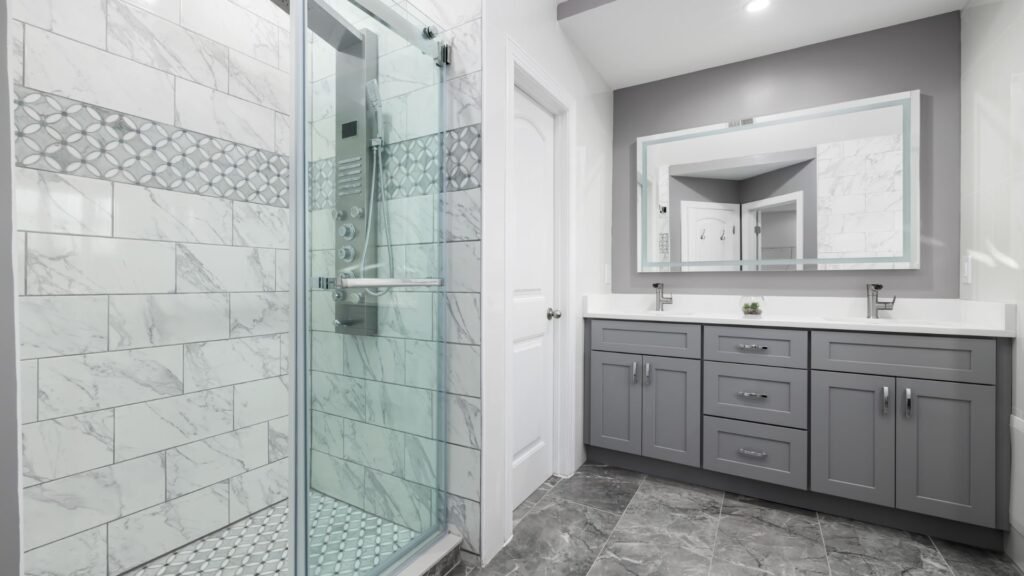
Kitchen Renovations In NZ
Kitchen renovations in NZ are one of the most common upgrades homeowners invest in, as the kitchen is often considered the heart of the home. A well-designed kitchen improves both day-to-day living and long-term property value. Whether you’re planning a complete makeover or just a functional refresh, understanding current design trends, practical upgrades, costs, and common mistakes can help you achieve the best results.
Popular Design Trends For NZ Kitchens
Modern kitchen design in New Zealand focuses on creating spaces that feel open, bright, and practical. Open-plan layouts are especially popular, as they connect the kitchen to dining and living areas, making the space more social and family-friendly. Natural light is another key trend, with many homeowners choosing larger windows, skylights, and lighter colour palettes to make kitchens feel bigger and more inviting. Sustainable materials are also in demand, with eco-friendly cabinetry, recycled benchtops, and energy-efficient appliances gaining traction as homeowners look for greener choices without compromising on style.
Functional Upgrades: Storage Solutions, Modern Appliances, Smart Kitchens
Beyond design, kitchen renovations in NZ often prioritise function. Clever storage solutions such as pull-out pantries, deep drawers, and custom cabinetry maximise space, especially in smaller homes. Modern appliances play a huge role in convenience, with many households upgrading to energy-efficient dishwashers, induction cooktops, and double-door fridges. Smart kitchens are also becoming more common, where technology is integrated into appliances and lighting for added comfort and control. Features like touchless taps, smart ovens, and app-controlled lighting are not just luxuries, they make kitchens safer and easier to use.
Cost Breakdown: Small Kitchen Vs. Large Kitchen Renovations
The cost of kitchen renovations in NZ can vary greatly depending on the size and finishes. A small kitchen renovation can range from $20,000 to $30,000, covering upgrades such as new cabinetry, benchtops, and standard appliances. Larger kitchens or luxury remodels can go from $35,000 to $60,000+, especially if custom joinery, high-end appliances, and premium finishes are included. Homeowners should also budget for trades such as electricians, plumbers, and builders, as well as unexpected costs that can arise once work begins. Setting aside a contingency fund of around 10–15% is highly recommended.
Mistakes To Avoid (Overcrowding Space, Ignoring Workflow, Poor Lighting)
Many NZ homeowners make avoidable mistakes during kitchen renovations. Overcrowding the space with oversized islands or too many cabinets can make the kitchen feel cramped instead of open. Ignoring the “kitchen triangle” workflow, how the stove, sink, and fridge connect, can reduce efficiency and make daily cooking frustrating. Poor lighting is another common issue; relying only on a single overhead light often leaves work areas in shadow. Instead, combining task lighting, ambient lighting, and feature lighting ensures both functionality and style.
Case Example: A Typical NZ Family Kitchen Upgrade
Imagine a standard 1980s NZ family home with a closed-off kitchen that feels dark and outdated. The renovation begins by opening the space to connect it with the dining area, instantly making the home feel larger and more social. Modern white cabinetry with soft-close drawers is installed, along with a durable stone benchtop. A central island with seating adds both storage and a casual dining spot. Natural light floods in through a new skylight, while energy-efficient LED lighting brightens work areas. Appliances are upgraded to a modern induction cooktop, a stainless steel fridge, and a built-in dishwasher. This renovation not only improves everyday living for the family but also increases the home’s resale appeal.
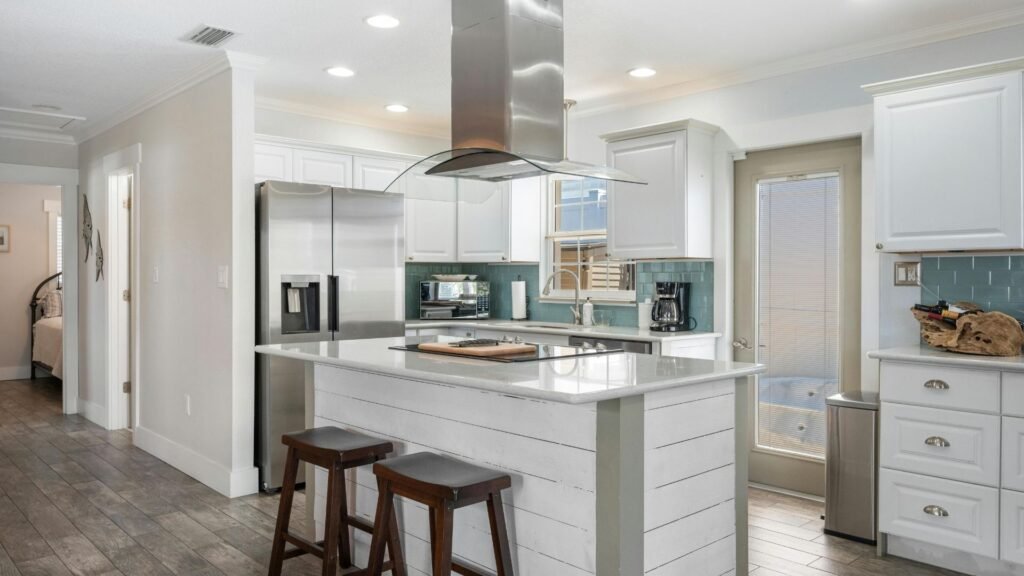
Bathroom Renovations In NZ
Bathrooms are no longer just functional spaces in New Zealand homes. They have become personal retreats where style, comfort, and practicality meet. Renovating your bathroom can bring new life into your home, improve energy efficiency, and even boost property value. Whether you are planning a small update or a complete overhaul, it’s important to understand the latest trends, practical improvements, costs, and common pitfalls before starting your project.
Key Trends In NZ Bathrooms
Modern bathroom design in New Zealand focuses on blending functionality with a clean, stylish look. Some of the most popular trends include:
- Walk-In Showers: Frameless glass walk-in showers create a sleek, open feel and are ideal for both small and large bathrooms. They also make cleaning easier compared to older shower units.
- Freestanding Tubs: Many Kiwi homeowners are choosing freestanding bathtubs as a centerpiece, giving their bathrooms a touch of luxury. They pair well with minimalist designs and natural finishes.
- Eco-Friendly Fixtures: Water-saving toilets, low-flow showerheads, and energy-efficient lighting are in demand across NZ. These not only reduce water and power bills but also support sustainable living.
These trends show a strong shift towards creating bathrooms that are both stylish and environmentally responsible.
Functional Improvements That Matter
A bathroom renovation should look good but also perform well in everyday use. Key areas to focus on include:
- Storage: Built-in cabinetry, floating vanities, and recessed shelving help keep clutter out of sight while making the most of limited space.
- Ventilation: Proper airflow prevents mould and mildew, which are common in NZ’s damp climate. Installing quality extractor fans and ensuring windows provide cross-ventilation is essential.
- Waterproofing: Cutting corners on waterproofing is one of the biggest mistakes. Professional installation with high-quality materials ensures your bathroom lasts for years without costly water damage.
These improvements may not always be visible, but they play a huge role in the durability and comfort of your bathroom.
Cost Breakdown For Bathroom Renovations In NZ
The cost of bathroom renovations in NZ varies widely depending on size, materials, and finishes:
- Budget-Friendly Renovations ($15,000–$20,000): Includes new tiles, updated fixtures, and basic plumbing upgrades. Ideal for landlords or homeowners looking for a simple refresh.
- Mid-Range Renovations ($20,000–$30,000): Often includes custom vanities, modern showers, upgraded lighting, and high-quality tiling.
- Luxury Renovations ($30,000+): These projects include premium finishes, freestanding tubs, underfloor heating, and designer fittings. Homeowners investing at this level usually want a spa-like experience.
Setting a clear budget at the start helps you balance aesthetics with practicality while avoiding unexpected costs.
Common Mistakes To Avoid
Even with the best intentions, bathroom renovations can go wrong without proper planning. Some mistakes to avoid include:
- Poor Waterproofing: This is the number one cause of long-term bathroom damage. Always use certified professionals for waterproofing.
- Choosing The Wrong Materials: Some materials look great but don’t hold up well in humid environments. Avoid porous stones and untreated wood unless properly sealed.
- Overcrowding The Space: Trying to fit too many features into a small bathroom can make it feel cramped and uncomfortable. Keep layouts simple and functional.
- Ignoring Ventilation: Without good airflow, even the most beautiful bathroom will develop mould issues over time.
Avoiding these pitfalls ensures your bathroom remains functional, durable, and attractive.
Case Example: A Small Bathroom Transformation
Take, for instance, a common 2m x 3m bathroom in a Wellington home. Originally, it had an outdated shower cubicle, worn-out vinyl flooring, and poor ventilation. The renovation included:
- Replacing the shower cubicle with a frameless walk-in shower.
- Installing a floating vanity with built-in storage to maximise floor space.
- Adding an energy-efficient extractor fan and skylight for natural ventilation.
- Using large-format tiles to create the illusion of a bigger space.
The result was a bright, modern, and functional bathroom that not only looked beautiful but also added value to the property.
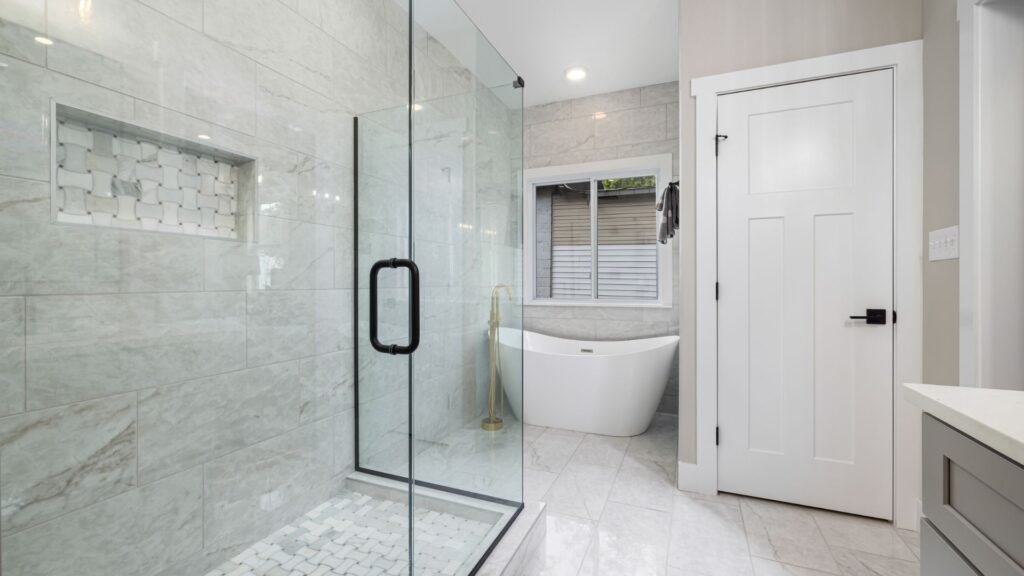
Finding The Right Renovation Company In NZ
Choosing the right renovation company is one of the most important steps in making your kitchen and bathroom renovation project a success. The contractor you hire will influence the quality of the work, how smoothly the process goes, and whether your project finishes on time and within budget. In New Zealand, the renovation industry is competitive, so doing your homework before signing a contract is essential. Below are practical steps that can help you select a reliable and trustworthy renovation company.
How To Research: Google Reviews, Word-Of-Mouth, Portfolios
Start your search by looking at online reviews. Google reviews often give an honest picture of how a company treats its clients, the quality of their work, and whether they deliver on promises. Look for businesses with a consistent track record rather than just a handful of good ratings. Word-of-mouth is equally valuable in NZ. Ask family, friends, or colleagues who have recently renovated about their experiences. Recommendations from people you trust can save you from costly mistakes. Finally, review portfolios on company websites or social media pages. Portfolios showcase past projects, giving you a clear idea of the company’s style, workmanship, and whether they have experience with kitchens and bathrooms similar to yours.
Checking Credentials, Licenses, And Insurance
Any professional renovation company in NZ should hold the proper licenses and qualifications. Always confirm that your chosen builder or contractor is registered with the Licensed Building Practitioners (LBP) scheme. This ensures they meet New Zealand’s building standards. Insurance is just as important. A reputable company will carry both public liability insurance and builders’ insurance, protecting you in case of accidents, damages, or unfinished work. Without insurance, you may end up covering unexpected costs out of pocket.
Questions To Ask Before Hiring
Before you commit, prepare a list of questions. Some useful ones include:
- How long have you been in business?
- Can you provide references from past clients?
- What is your estimated timeline for this project?
- Do you handle all the work in-house or subcontract to others?
- What guarantees or warranties do you offer?
Asking these questions not only gives you clarity but also helps you see how open and transparent the company is. A professional renovation company in NZ will welcome questions and provide straightforward answers.
Importance Of Written Contracts And Clear Communication
Once you’ve selected your renovation company, make sure everything is put into writing. A written contract protects both parties and outlines the scope of work, payment schedule, timeline, and responsibilities. This reduces misunderstandings and ensures everyone is on the same page. In addition, clear communication is key. Regular updates, site meetings, and a single point of contact make it easier to track progress and solve issues quickly. When communication is strong, you can avoid delays, hidden costs, and unnecessary stress.
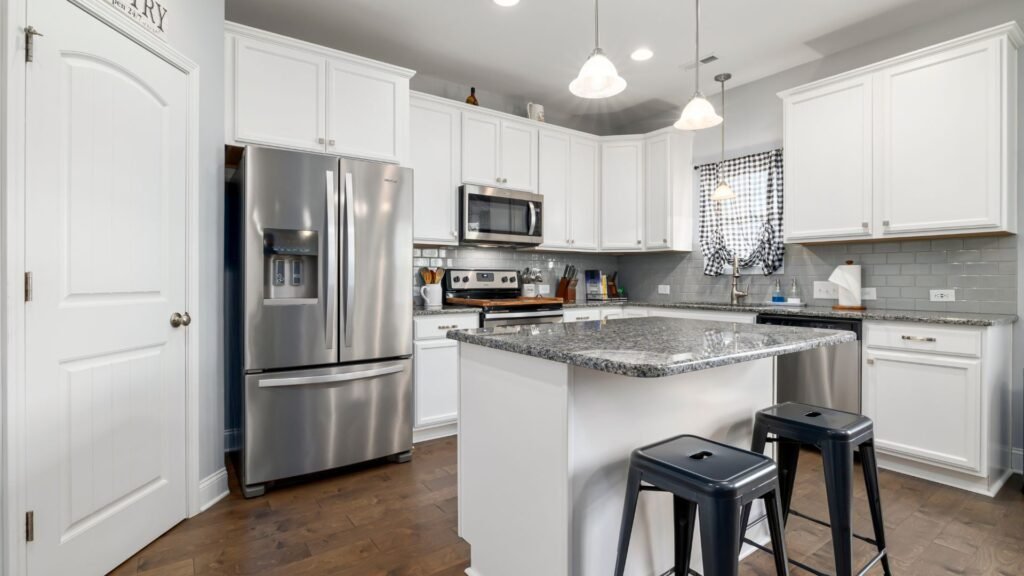
Practical Tips For A Smooth Renovation
Renovating your kitchen or bathroom in New Zealand can be an exciting project, but it often comes with challenges if not managed well. From setting clear expectations to choosing reliable suppliers, small decisions can make the difference between a smooth renovation and a stressful experience. Below are practical tips every NZ homeowner should follow to keep their renovation on track.
Communicate Expectations Clearly
Clear communication is the foundation of any successful renovation. Before work begins, sit down with your renovation company or tradespeople and outline exactly what you want. Be specific about design details, timelines, and budget limits. Misunderstandings often occur when homeowners assume contractors “just know” what they mean. The more detailed you are about your expectations, the fewer surprises you’ll face later. Regular check-ins with your builder or designer also help keep everyone aligned.
Stay Flexible With Designs But Firm On Budget
It’s natural to want your dream kitchen or bathroom, but renovations often bring unexpected challenges like hidden water damage or supply delays. Being flexible with design elements, such as tile choices or fixture styles, allows you to adapt without derailing the project. On the other hand, staying firm on your overall budget is crucial. Decide early on what areas you are willing to compromise on and what features are non-negotiable. This balance ensures you still get a result you love without overspending.
Prepare Your Home With Temporary Setups
Living through a renovation can be disruptive, especially when your kitchen or bathroom is out of action. A smart approach is to set up temporary spaces. For kitchens, a portable cooktop, microwave, and small fridge in the garage or dining area can help you keep meals simple. For bathrooms, consider arranging access to a second bathroom if available or renting a portable shower. These preparations will reduce stress and help your household run smoothly during construction.
Work With NZ Suppliers For Quality And Speed
One of the best ways to avoid renovation delays is to source materials locally. Working with New Zealand suppliers means faster turnaround times, easier returns, and better after-sales support. You’ll also have access to products that meet local building codes and standards. While imported fittings might look appealing, they often come with long shipping times and higher costs. Choosing local suppliers ensures both quality and reliability for your renovation.
How To Avoid Stress During Renovations
Renovations can test your patience, but a few strategies can make the process far less overwhelming. First, manage your expectations, delays and small hiccups are common, and stressing over them won’t help. Second, stay organized by keeping all contracts, invoices, and schedules in one place. Finally, remember why you’re renovating in the first place. Keeping your focus on the end result, a beautiful, functional kitchen or bathroom, will help you stay motivated and positive throughout the journey.
Whether it’s a modern kitchen, a stylish bathroom, or both, we’re here to help. Check out our homepage and take the first step today.
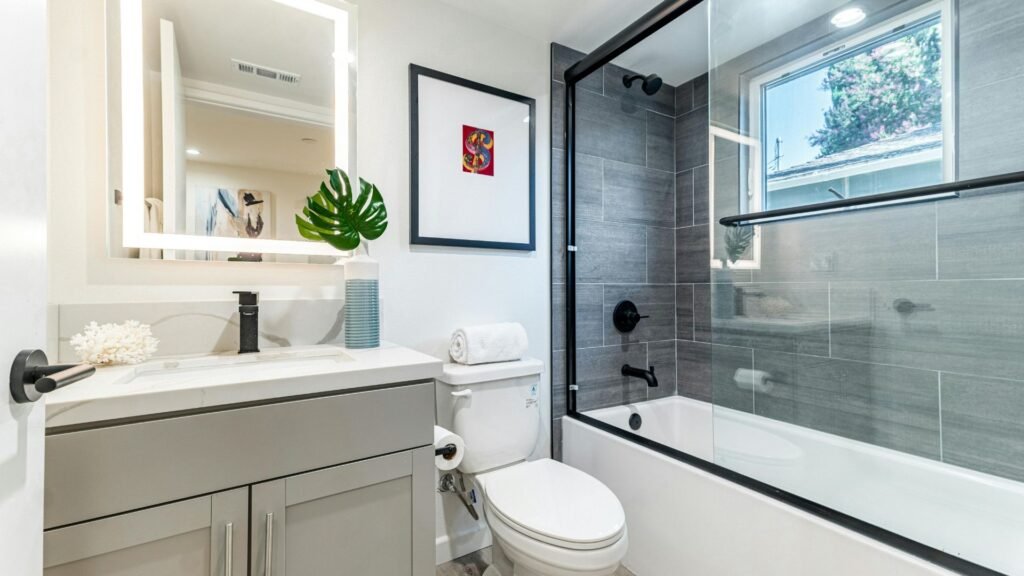
FAQs: About Kitchen And Bathroom Renovations In NZ
What is the average cost of kitchen and bathroom renovations in NZ?
The cost of kitchen renovations in New Zealand typically ranges from $20,000 to $40,000 depending on size, materials, and finishes. Bathroom renovations usually fall between $15,000 and $30,000. High-end projects may cost more if luxury fittings or custom designs are included.
How long does a kitchen renovation usually take in NZ?
A standard kitchen renovation in NZ takes around 4 to 6 weeks. This timeframe can extend if there are structural changes, custom cabinetry, or delays with suppliers. Planning ahead with a clear timeline helps avoid unnecessary hold-ups.
How long does a bathroom renovation usually take in NZ?
Bathroom renovations generally take 3 to 4 weeks from start to finish. The timeframe depends on the complexity of the design, availability of tradespeople, and whether plumbing or electrical work requires additional approvals.
Do I need council consent for kitchen or bathroom renovations in NZ?
In most cases, cosmetic upgrades do not require council consent. However, if you are moving plumbing, making structural changes, or adding new drainage systems, consent may be required. Always check with your local council before starting.
What are the most popular kitchen design trends in NZ right now?
Some popular trends in New Zealand kitchens include open-plan layouts, sustainable materials, soft-close cabinetry, large kitchen islands, and energy-efficient appliances. Many homeowners also favour natural finishes like wood and stone.
What are the most popular bathroom design trends in NZ right now?
Modern bathroom trends in NZ include walk-in showers, freestanding bathtubs, underfloor heating, eco-friendly fixtures, and minimalist designs. Neutral tones combined with natural textures are also in high demand.
Should I hire a renovation company or attempt DIY?
Small cosmetic updates like painting or replacing handles can be done DIY. For larger projects involving plumbing, electrical work, or structural changes, hiring a licensed renovation company in NZ is strongly recommended to ensure safety and compliance.
How can I choose the right renovation company in NZ?
Look for licensed builders with positive reviews, strong portfolios, and transparent pricing. Ask for references, check their credentials, and always get a written contract. Meeting the team in person also helps you gauge communication and trust.
How can I keep costs under control during a renovation?
Set a realistic budget with a 10–15% buffer for unexpected expenses. Prioritise essential upgrades over luxury extras. Source materials locally when possible and communicate clearly with your contractor to avoid hidden costs.
Do kitchen and bathroom renovations add value to a home in NZ?
Yes, kitchens and bathrooms are considered the most valuable renovations in New Zealand homes. Well-executed upgrades not only improve daily living but can also increase property resale value significantly.
Conclusion
Kitchen and bathroom renovations in NZ are more than just cosmetic upgrades, they’re smart investments that improve your lifestyle, increase daily comfort, and add long-term property value. Whether you dream of a modern open-plan kitchen or a spa-like bathroom retreat, the key is to start with clear goals, a realistic budget, and the right team of professionals. By planning carefully and working with trusted local renovation experts, you can avoid costly mistakes and enjoy results that truly reflect your needs and style. If you’re ready to take the first step, start planning your project today and reach out to experienced NZ renovation specialists for a tailored quote or consultation that will bring your ideas to life.

